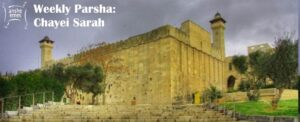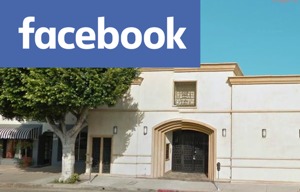Chayei Sarah
I. Summary
A. Sarah’s Burial. Sarah died in Hebron at the age of 127. Upon hearing the news, Abraham quickly returned from Be’er Sheva to mourn and eulogize her. Abraham bought the nearby field and cave of Machpelah from Ephron the Hittite as her burial place. He then buried Sarah in the cave.
B. Finding A Wife For Yitzchak. Abraham now grew anxious to find a wife for Yitzchak. He instructed his faithful servant Eliezer to find the proper mate for Yitzchak, which Abraham insisted be found from his native land, not from the daughters of the Canaanites. Eliezer asked Hashem’s guidance. Eliezer then left, along with 10 camels laden with Abraham’s best possessions, on his journey to Abrahams’ kindred in Aram Naharayim. He arrived towards evening and stopped at the well outside the city, where he prayed to Hashem that he find the proper mate for Yitzchak. He prayed that Hashem make him successful in the following manner: He would ask a woman at the well for water. The woman who would reply “drink, and I will draw water for your camels as well” would be the woman chosen by Hashem for Yitzchak.
C. Eliezer Meets Rivka (Rebecca). Before Eliezer finished his prayers, Rivka arrived at the well and filled her pitcher. Eliezer ran towards her and asked for a sip of water from her pitcher. Rivka gave Eliezer water to drink, then quickly drew water for all of his camels. Upon seeing this Eliezer, hoping silently that his prayers had been answered, presented Rivka with jewelry. Eliezer was overjoyed to discover that Rivka was actually the granddaughter of Nochor (Abraham’s brother). He bowed and blessed Hashem for bestowing his great kindness upon Abraham. Rivka took Eliezer to her home, where he told her family the entire story of his journey. They agreed to the match and allowed Sarah to return with Eliezer to Canaan to marry Yitzchak. Eliezer showered Rivka with more gifts and gave presents to her family. Eliezer brought Rivka back to Canaan, where she met and married Yitzchak.
D. Abraham Marries Keturah. Abraham took another wife, Keturah, with whom he had more children. Abraham gives beautiful gifts to these children as a legacy, but left everything else he owned to Yitzchak.
E. Abraham’s Death. At age 175, Abraham died and was buried by his sons Yitzchak and Yismael in the Cave of Machpelah.
II. Divrei Torah
A. Lil’Mode U’lilamed (Rabbi Mordechai Katz)
1. Sarah’s Greatness. The Torah says “Abraham came to eulogize Sarah and to weep over her”. In the Torah, the letter “kaf” in the word “livkosah” (“to weep over her”) is smaller. Why? When Sarah died, Abraham didn’t mourn excessively for he realized that she had lived a full and rewarding life. She had accomplished much during her stay on earth, and her good deeds were innumerable. Because of her outstanding righteousness, Hashem bestowed upon her special qualities. In fact, in terms of prophecy, she was even greater than Abraham. Therefore, the small “kaf”; the loss was great, but the comfort of her fulfilled life made it easier to accept. Those who, like Sarah, assist others benefit both in this world and the World to Come. Their memories are cherished fondly and their good deeds and accomplishments are commemorated forever.
2. Rivka’s Chesed. Abraham instructed Abraham to find a wife for Yitzchak from his own family, not the Canaanites. Why, since both were devoted idol worshipers? Abraham understood that there are certain characteristics which are inherited from one’s parents. Mercy and compassion for others can only be taught to a certain degree; it must be made part of the person, inherited from one’s parents. Idol worship, on the other hand, is dependent one’s intellect; one can select or reject it. Rivka inherited traits of goodness and kindness — exemplified by her act of kindness to Eliezer — which would serve as a good basis for her role as one of the Matriarchs.
B. Growth Through Torah (Rabbi Zelig Pliskin)
1. See the good in every life situation. Rashi comments that all of the years of Sarah’s life were equally good. How could this be, since she seemed to have suffered much in her life (e.g., for many years she was childless, for many years she experienced famine and exile, she was taken captive)? Rabbi Zushe of Anipoli explained that Sarah mastered the attribute of constantly saying “this too is for the good.” Sarah was constantly aware that even those events which others might consider to be bad were from Hashem, and was therefore able to evaluate them as being positive. The quality of one’s life isn’t dependent on external situations. The Torah ideal is to be aware that the purpose of our life is to perfect our character, and that every life situation is an opportunity for growth. Sarah mastered this level of consciousness. Thus, at the end of her life which was constantly devoted to growth, it could be said that all her years were good.
2. Understanding What Someone Else is Really Saying. “And Abraham heard Ephron. And Abraham weighed for Ephron the silver which he spoke about in ears of the B’nai Chas, 400 shekels of silver that merchants used.” On the words “Abraham heard,” the Rashbam commented that “a hint is sufficient to the wise person.” Ephron spoke as if he was a generous man and ostensibly offered Abraham the burial place for free. However, Ephron mentioned in passing that the “400 shekels that one might usually pay is nothing between friends. Your friendship is more precious than money. Take it without payment.” Abraham was perceptive and realized that Ephron didn’t want to give away the land for free. Abraham “heard” with his well-developed intuition and understood Ephron’s real intentions. He responded to Ephron’s real wishes and not his superficial words. The ability to differentiate between what someone says and what they really mean is an attribute that we must develop. For example, someone may make a belittling remark about something he accomplished, really hoping to hear a kind word since he is doubting the quality of what he did and wants reassurance. For many areas of spiritual growth and to truly achieve the mitzvah of “loving your fellow man”, the ability to really “hear” someone is essential. The Steipler used to say in the name of the Chazon Ish that when someone came to speak with him about a number of topics, he knew as a rule the last thing they spoke about was the real reason they came to consult with him. Everything else was just to conceal this real reason.
3. Accomplish Something Every Day. “And Abraham, was old, he came with his days.” Not a day in Abraham’s life was wasted; each and every day he accomplished something. Each day is a new and entirely different experience. At the beginning of each day, we should each ask “what can I accomplish today?”; at the end of each day, we should each ask “what have I accomplished today?”
C. Majesty of Man (Rabbi A. Henach Leibowitz)
Who is wealthy? “And Abraham expired and died in a good old age, mature and content.” Ramban explains that this verse underscores Abraham’s greatness; he was “someiach b’chelko” (“satisfied with his lot”). But, such praise for Abraham seems puzzling. After all, Hashem blessed Abraham with extraordinary wealth and honor. He was furthermore saved from the fiery furnace, given a son in his old age and promised that his descendants would not only be as numerous as the stars of the heavens but would ultimately be selected as Hashem’s chosen nation. What is really a test for Abraham, who had so much, to be happy with his lot? Wouldn’t each of us be happy with our lot is we merited all of these rewards? The Torah is showing us the powerful force of the human desire for wealth. It is a challenge for even the most righteous to overcome. We often hear the familiar refrain “If I won the lottery, then I would be happy. I would give to charity . . . ” This statement indicates that a person isn’t satisfied with what he has now, and that even if his money doubled or tripled his desire for more would merely keep a step ahead. Were it not for Abraham’s unique capabilities even he, who was blessed with so much, would not have been happy with his lot. Hashem equips each of us with the tools and materials we need to serve Him properly, and furnishes us with the ability to live with what He has given us. If we focus on and accept this truth, then regardless of our financial situation, we will be wealthy. As Ben Zoma teaches “who is wealthy? one who is happy with his lot.”
D. Peninim on the Torah (Rabbi A.L. Scheinbaum)
A living memorial. “And Abraham came to mourn for Sarah and to weep for her.” In this Parsha, we study Sarah’s death and Abraham’s struggle to find an appropriate burial place for her. The Moreshe Moshe elaborates on this concept — the Mourners’ Kaddish is not only a prayer for the departed, but for the living as well. In the world of the living, Hashem’s name should be “yisgadal v’yiskadash” (“greater and more hallowed”). Thus, after immediately after the demise and burial of Sarah, the Torah continues to tell us of Abraham’s pursuit of his mission. The Parsha end with his passing and burial next to his life partner. In between their deaths is the beginning of the family life of their successor, Yitzchak. It was as though the repose of their souls was dependent on the establishment of Yitzchak’s family. When Sarah died, Yitzchak wasn’t at her side since he was then studying in the Yeshiva of Shem. Learning to recite Kaddish is important, but learning to live the ideals of Kaddish is even more important. The greatest gift of Kaddish is to reaffirm the faith of one’s parents, to reflect in one’s life his/her parent’s highest standards. This is was occupied Yitzchak when his mother’s mortal remains were lowered into the ground. In the ensuing year, Yitzchak was not consoled until a suitable wife who reflected his mother’s ideals was found was him. The greatest memorial one can establish for a parent is a “living memorial”.
E. Love Thy Neighbor (Rabbi Zelig Pliskin)
Chesed reveals a person’s virtue. The Midrash cited by Rashi states that Eliezer ran to meet Rivka because he saw the water from the well miraculously rise to meet her. Those he witnessed this event, he didn’t consider it sufficient evidence to prove that she was worthy to be Yitzchak’s wife. A test of your eagerness to do “chesed” (kindness) was still necessary. From here we see that even if a person is worthy of having miracles performed on his/her behalf, he/she is not deemed truly worthy unless he/she performs acts of chesed.
F. In The Garden of The Torah (the Lubavitcher Rebbe, Rabbi Menachem M. Schneerson, z’tl)
Sarah’s Ongoing Legacy. Why is the Parsha entitled “Chayei Sarah” (Sarah’s life), when it begins with her death which features in much of the subsequent narrative. This question can be resolved on the basis of our Sages’ statement in Taanis that “Yaakov our Patriarch did not die”. Although he was buried and mourned, his descendants perpetuate his spiritual heritage and so he is still alive. The same can be true of any individual — it is the spiritual content of our lives, not our physical existence, which is fundamental. The boundaries of physical existence can not contain the spiritual dimension. This is the message hidden in this week’s Parsha — that Sarah’s spiritual “tree” continued to bear fruit long after her physical life had ended. The deeds we perform in life precipitate others. Thus, our Sages in Sanhedrin tell us that when one brings merit to others, the merit which others in turn generate is also credited to him. The goodness with which a person endows his family and environment creates an on-going dynamic towards good; this dynamic continues to bear fruit after that person’s passing — it increases the goodness and virtue in the world until the coming of the Messianic Age when these forces will permeate all existence.
G. Soul of The Torah: Insights of the Chasidic Masters of the Weekly Torah Portions (Victor Cohen).
1. Taking Everything In Stride. “The lifetime of Sarah was . . . .” The S’fas Emes noted that Sarah experienced good and bad events in her life. In her early years she endured many trials, and at the end of her life she lived in relative peace. Yet, all of the events were equal (as Rashi says, “all were as a positive nature”). That is, when the negative occurred, she did not become depressed nor did she become arrogant when she prospered.
2. Reciprocity. “And G-d blessed Abraham with everything.” The Berditchever said that G-d blessed Abraham with everything because he blessed everyone. Every time Abraham blessed someone, it was put into his account.
H. Pirkei Torah (Rabbi Mordechai Gifter)
“And Abraham was old”. The effects of old age originally went unnoticed. People would grow old , but not appear so. Chazal relate that Abraham requested the appearance of old age, rationalizing that “a father and son will enter a place, and no one will be able to discern the father to honor him. ” G-d agreed and granted Abraham’s request. The Midrash notes that Abraham was not concerned that people would not want to give respect – he felt that they would indeed be willing to respect their elders, however, he was concerned that they would be unable to direct this respect towards the elderly. Abraham understood that a society willing, yet unable, to respect its elders will quickly descend into a state of dissension. Thus, Abraham requested the appearance of old age for the benefit of all mankind. This remains an important lesson to all of us about respecting our elders.
I. Something To Say (Rabbi Dovid Goldwasser)
Rising Up From Adversity. “Abraham rose up from the presence of his dead. ” The Minchas Ari explains that when we suffer a great loss or similar misfortune, we can become overwhelmed by the burden and fall from the spiritual level we have attained. However, we are told that Abraham “rose up – he stood up fully, remaining unbowed. Upon liberation of the Buchenwald concentration camp, a special minyan was arranged for the liberated inmates of the camp on the first night of Shavos. As Reb Yosef, one of the survivors, got up and started towards the place of assembly, someone asked him where he was going. When he replied that he was going to pray, the questioner raised his eyebrows in bewilderment and said “you are going to pray?!”. Reb Yosef answered, “I no longer have my family. My worldly possessions are gone. The only thing that I still have left is my faith.”
J. Torah Gems (Rabbi Aharon Yaakov Greenberg)
1. A True Legacy. “These were the years of the life of Sarah”. Generally, we refer to people in terms of the years: he/she was born in this year and died in this year, etc. In the case of our greatest individuals, the years are referred to in terms of the people, because the years become special by virtue of their presence. Thus, the Torah refers to “the years of the life of Sarah.” (Divrei Sha’ul).
2. True Acceptance. Rashi explains that all of the years of Sarah’s life were “equally good”. How can this be? As far as Sarah was concerned, whatever happened to her was considered good.
3. Communal Well Being. “And the Lord has blessed Abraham with all . . . ” The truly righteous do not pray for only for themselves, but rather for the whole community. Thus, when G-d blessed Abraham, He blessed the entire community. (Kedushat Levi).
4. Being Truly Content. On the prior verse, Or Li-Yesharim noted that G-d blessed Abraham with the quality of “all,” of being content with whatever he had and never feeling that he was lacking anything.
5. Proper Conduct. Rashi notes that Eliezer saw that the water (in the well) rose to meet Rebecca. If so, why did he go on to test Rebecca? From here we can see that a single instance of proper behavior is more important than 100 miracles and signs. (R’ Yehezkel of Kuzmir).
K. Vedibarta Bam (Rabbi Moshe Bogomilsky).
1. Ongoing Legacy. Why is the Parsha entitled the “Life of Sarah” when it starts with her death? The Lubavitcher Rebbe, zt’l explains that the “life of Sarah” was focused on one goal and ideal – that her son Isaac should reach spiritual greatness. The Parsha discusses the life of Isaac, who was the realization of Sarah’s spiritual dream. Though we read of her demise and burial, through Isaac her ideals were fulfilled. Though physically Sarah was no longer in this world, she continued to live on through Isaac.
2. A Truly Fulfilled Life. “And Abraham was old and advanced in age.” Why does the Torah and the words “advanced in age” [literally “days”]? We come into this world with a mission – to study Torah and do good deeds. The Torah attests that Abraham was able to account for what he accomplished each and every day of his life. Not only did he age in years, but he was able to recall each day and say what he had achieved in it.
3. A Loyal Child. “And Abraham was old and advanced in age and G-d blessed Abraham with everything.” The word “bakol” (“with everything”) has the numerical value of 52, which is also the value as the word “ben” (“son”), thus alluding that Abraham had a son (Rashi). What is the connection between Abraham becoming old and his having everything (i.e., a son)? There is an old adage, “a father or mother can manage their ten children but ten children cannot take care of one father or mother.” Often, as parents grow older, children consider them a burden and find caring for them difficult. Abraham, however, was blessed with a son (Isaac) who was profoundly grateful for the love and concern provided to him by his parents. The Torah tells us that Abraham was blessed with “everything” to teach us that, although he remained alone and advanced in age. Such a child is indeed a blessing to any parent.
4. Mother To Thousands. “They blessed Rivka (Rebecca) and said to her, ‘our sister be the mother of thousands of ten thousands.'” Before a chuppah, when the groom covers the bride’s face with a veil, it is customary to recite this blessing. What is it’s meaning? When G-d blesses us with financial success it is proper to give a portion to charity. When we support a Jewish school, the children who are learning Torah to our financial assistance are considered our children. Years later, the students of those students (as well as their offspring) are also considered our children. Thus, the blessing to the bride is that in her marriage she should be blessed with wealth and imbued with the good sense to give charity to Torah institutions. Through helping children receive a Torah education, she in turn becomes a mother of thousands of children.
L. There Shall Be Light (Rabbi Yitzchak Meir Goodman)
1. All For The Best. ” . . . one hundred years and twenty years and seven years, the years of Sarah’s life.” Rashi quotes a Midrash that Sarah was as guiltless at 100 as she was at 20 and as beautiful at 20 as she was at 7. If so, shouldn’t the numbers in this verse be reversed (i.e., signifying that she remained equally beautiful from 7 to 20 and equally innocent from 20 to 100)? On the phrase “the years of Sarah’s life,” Rashi cites the Midrash that “all were equally good.” How that that be? The answer to both of these issues is that, as G-d told Moshe, “you will see My ‘back,’ but My ‘face’ will not be seen (Shemos 33:23). That is, we can only understand G-d in hindsight, not while events are unfolding. So, too, only in Sarah’s old age did she realize that all of her trials and tribulations were for the best. To hint at the concept, the Torah lists her ages in reverse chronological order.
2. The Eternity of the Soul. As noted above, the Talmud teaches that until Abraham pleaded for mercy, there was no old age. R’ Yaakov of Lisa interprets this passage as follows: until Abraham, there was no respect for old age. People simply equated it with deterioration because they denied the Divinity of the soul, the only thing that improves with age. Thus, Abraham’s plea for mercy was a prayer that G-d should help convince others of the eternity of the soul. Once his prayer was answered, there was old age (i.e., respect for the wisdom and experience of elders, who spiritual powers increase even as their physical strength wanes).





 Visit the group and request to join.
Visit the group and request to join.
